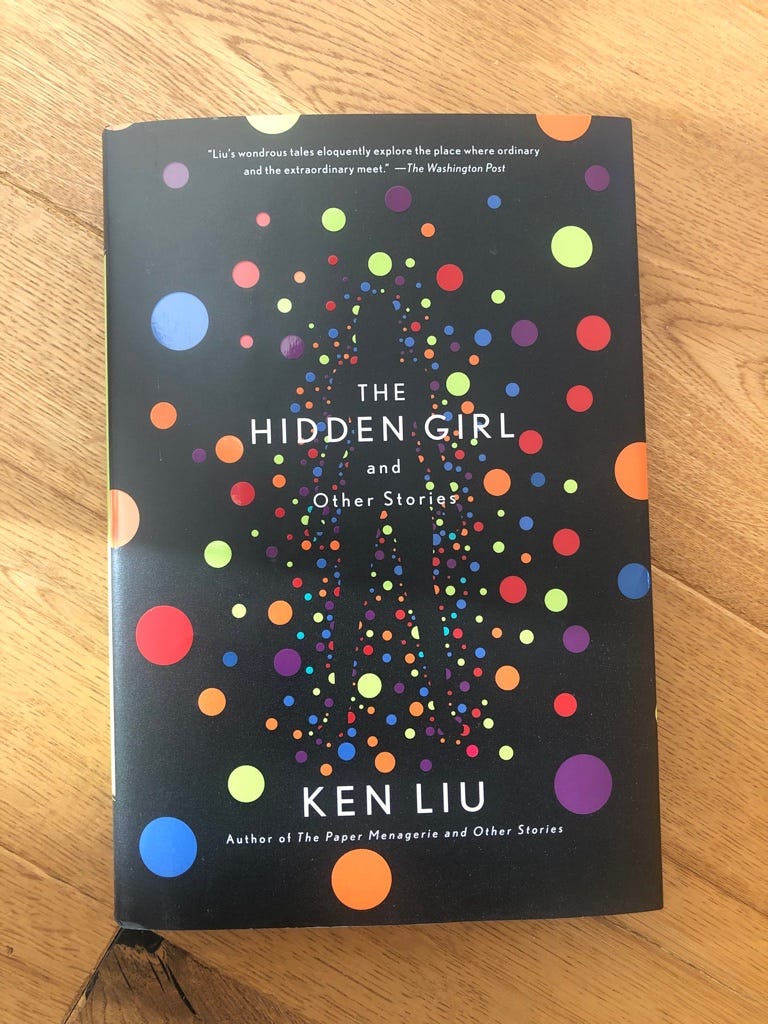018: Ken Liu and Fleeting Feeds

Ken Liu’s new anthology, The Hidden Girl and Other Stories, has dropped and everyone should read it. I’m working my way through, and so far, it’s a delight. The first story cold opens with Lisp!

Liu is not widely known outside of speculative fiction genre circles, but he should be. He’s one of the most productive writers and editors, having written an epic fantasy and 60+ short stories (winning the Hugo).
If you’re a techie, you’ve probably seen the Remembrance of Earth’s Past books (aka Three Body Problem trilogy) on every Silicon Valley bookshelf. Liu made this happen: he translated two of the books in the series, introducing a wide western audience to Chinese sci-fi for the first time.
Translating between such drastically different cultures is difficult, and Liu has done a lot to bridge the gap between China and the English speaking world. I attended a panel at last year’s WorldCon with a few Chinese authors and translators. All credited Liu for paving the way.
One author made an interesting remark: working with translators has changed his own writing. Narrative prose in Chinese is circular, weaving around topics in a way that would disorient Americans. He worked closely with translators to restructure his prose for the more linear and logical western way of thinking. When he returned to write, his Chinese prose had been altered by the act of translation. Language shapes your thinking. (Cue Arrival and the heptapods.)
If you’re still on the edge about getting the anthology, go and read his short story Paper Menagerie. It perfectly (and devastatingly) captures the Chinese-American diaspora experience.
Every so often, the content in feeds references its own algorithmic nature—like a network understanding its own shape:

“I guarantee you did not search for this video”
“Who else is here watching in 2019”
“Recommend this one year after upload? Not yet. Two years? Nope. Four years? Now!!”
We are all ships passing in the night on a sea of algorithmic feeds, never knowing who else is seeing niche content gone viral. These comments are light beams cast upon passing ships. Why are we here? Why is this content anointed? These meta-questions are fruitless. Only the algorithm gods know for sure.
In minutes, the river will carry us downstream, and we will forget this video ever existed. We are here together with strangers, only briefly. And sometimes, it’s cathartic to shout into the darkness.

My friend Timoni recently tweeted:

I decided to take her up on it:
Humming
We sat under that old willow tree, your head nestled into me. My mom would be furious if she caught us together like this. But you were having another spell, and I couldn’t let you be alone. Already, your breath had slowed.
A band of kids screamed by playing a rough game of tag. “Parents let them run wild,” I said, twirling strands of your long brown hair between my fingers.
“I remember when you were just like them,” you said, reaching up to pinch my cheek. “You wore that red cape… never took it off. It was so tattered and gross. You wanted to be superman. Wanted to save everyone. And me, too, even though I was so much bigger than you.” You pursed your lips and gathered yourself, like your brain was yawning. “I remember when you were in diapers. A few summers ago.”
“Shut up,” I said, playfully pecking your cheek. “That was ten years ago.”
Back then, I only knew you as the mysterious next door girl. The one my mom said was slow.
An iridescent hummingbird flitted by my face, then landed on your arm, its chest moving up and down in a frenzy. To the bird, its pace was normal, a requirement for its rapid metabolism.
You sat up, eyes intent. “Why do you like me?”
“You’re beautiful and smart.”
“Cut that crap,” you said. “I’ve heard it before.”
“You aren’t afraid to speak your mind. You’re... unique.“
“You can say it. A leap kid. I'm a leap kid.”
“That isn’t why I love you.”
“You don’t know what love is. You think love is what you see in movies,” you said. “You’re barely a teenager.”
“Don’t you think I’ve known you long enough to know?”
“You knew me as the girl at the park that helped you when you were tangled in the swings. By the time I graduate, you’ll be thirty. We don’t have a future together.” You sighed. “Guys like you come and go. It’ll be the same pain again. All the false promises,” you said. “You know why they call us leap kids, right? Our faces are young for most of our lives. Then we die, just as the world starts to see us as an adult. No one bothers to look inside.”
“You won’t be a kid to me,” I said. But I knew whatever I said was futile. Maybe I was living a fantasy no different than that cape.
You laughed. “You’ll see. You’ll change. You don’t have any idea how much you’ll change. And then you’ll think that I’ve stayed the same.”
“Then doesn’t that make our ‘now’ even more important?” I imagined you and I as two curves on graph paper that intersected at only one point.
You looked up at the drifting clouds. “I want to be an old woman some day. I wouldn’t even care about the wrinkles.”
“I know you wouldn’t,” I repeated, managing a smile.
You nestled back into my chest. The kids were gone now, the sun lower in the sky, peeking through the willow tendrils.
You fell asleep, and I watched your chest rising and falling so slowly—for the first time, I counted: only once or twice a minute. I realized that to you, I was that hummingbird, flailing around like crazy, never taking the time to appreciate what I had, judging things for how they might grow, not what they are now.
I won’t make any promises for the future, but I will do what I can to understand:
I slowed my breath to match yours.
What I’ve written:
Storytelling Resources — A list of useful resources that helped me learn the craft of prose narratives.
Continuous Publishing — A new crop of writers that share their thoughts in a continuous fashion as opposed to blog posts.
What I’m ingesting:
The Chronicles of Now — Short stories based on the news, created by Tyler Cabot, previously the fiction editor at Esquire.
How should we evaluate progress in AI? — AI skirts the boundary between engineering, science, and design. This complicates the way we make, and measure, progress.
Progress, Postmodernism and the Tech Backlash — Alex Danco details the current media backlash against tech:
No one cares about your product; we care about your adoption. No one cares about what your technology does; we care about what problems it solves for users, and how fast you can grow. The first commandment of tech is Build Stuff People Want.
A Googol-to-1 gear ratio machine — The last gear will never turn. It might as well not be a gear at all.
I will leave you with some Covid-19 inspired art from my four-year-old:


These next few weeks (and perhaps months) will be a trying time. Wash your hands 🙏🙏🙏, breathe, help your community, and continue to create things. We will get through this.

